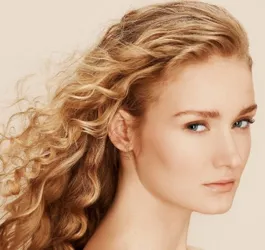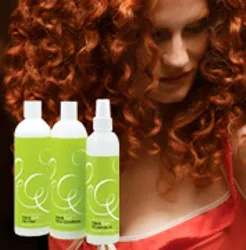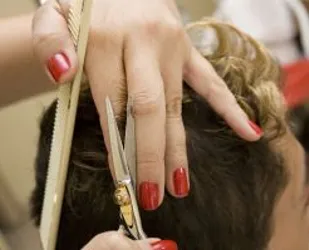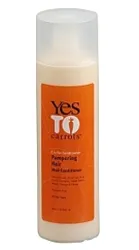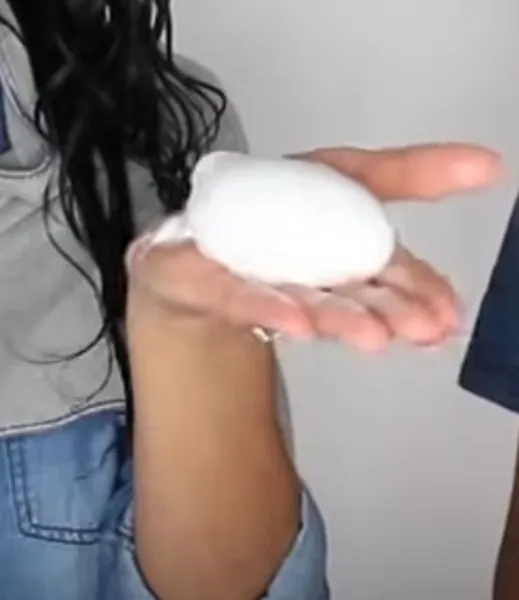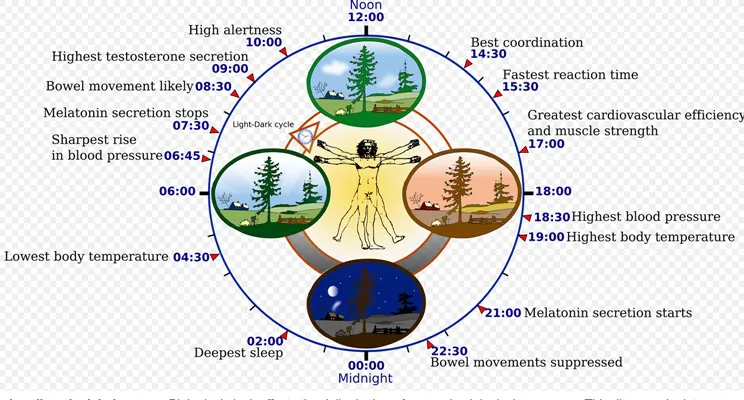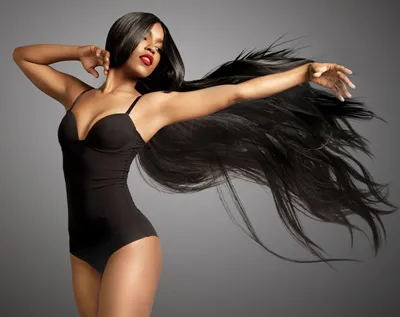
Hair Cones - Is Your Hair For Or Against Cone Related Ingredients?
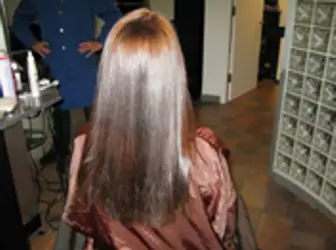 One of the most controversial topics centered around hair growth, ongoing haircare, maintenance and styling revolves around the topic of hair cones.
One of the most controversial topics centered around hair growth, ongoing haircare, maintenance and styling revolves around the topic of hair cones.
It's especially debated in the long hair, curly hair and African American communities. Some people swear cones leave their hair silky, soft and easy to manage. Others claim they destroy their hair.
Certainly a lot has been written about the pros and cons of cones since they were first incorporated into modern hair products.
(Image of shiny silky cone infused hair from Rusk - All Rights Reserved)
Who is correct? Neither. Why? Like any hair care question, whether cones or good or bad depends on their use and the hair it is being used on.
What's a hair cone? It's any hair product from shampoo and conditioners to hair styling products which contain some form of silicones which is the long word for cones.
Silicones are often listed in the ingredients and end in "cone" although some cones are not as obvious. Two popular cone products used in hair care products are dimethicone and cyclomethicone. Cyclopentasiloxane is an ingredient that is a cone product.
Dimethicone Versus Cyclomethicone
Dimethicone sometimes referred to as simethicone is the heaviest of all silicones used in the hair care market. Although it is the heavies of cones it also has the most smoothing effect. While it provides lots of smoothing it can be difficult to wash out. Some hair consumers who don't like the heavy cones refer to them as hair wax for their hair meaning it just adds a thick coating to the top of the hair.
Dimethicone can build up on the hair and may need to be removed with a clarifying shampoo. Dimethicone can not normally be removed with Conditioning Only (CO) washes or diluted shampoo cleanses.
Cyclomethicone
Cyclomethicone is lighter than dimethicone and it provides a great slippery feeling during the rinse cycle, but it quickly evaporates leaving nothing behind. Cyclomethicone does not necessarily need to be removed with clarifying products since it doesnt not normally leave any residue on the hair.
Moisture Blocking
One of the primary reason some hair users don't fare well with hair cones is because the cones may block moisture. Depending on the hair type (fine/thin, medium, thick, super thick), texture (straight, curly, wavy, kinky, combination) and condition (healthy, slightly damaged, damaged, very damaged) and length (short, medium, long, super long) cones may or may not be a positive factor.
Hair cones can leave hair feeling puffy, dry and rough.
Cone haters claim that cones don't allow the hair to breathe but this argument doesn't really hold up because hair is dead once it leaves the scalp and it doesn't breathe.
Cone lovers and hair experts point out that cones and polyquats are great for flyaway hair because it smoothes the cuticle, weighing it down and making the hair sleek. It doesn't impede oxygen intake. While it may not wash off compleely, if you actually switch to a non-polyquat shampoo the frizz and flyaways will return.
Hair Type, Texture, Condition, Length
Some hair type, textures, conditions and lengths can tolerate cones with no visible problems, others can not tolerate any. Even more important to note is that some cones in certain products such as leave-in conditioners are more intrusive to the hair than cones found in rinse-out conditioner and some types of styling products.
It really and truly is a matter of personal experience and hair type, texture, length and condition (TTLC).
Some Hair Care Lines Contain Excessive Cones
Some hair care lines are famous for using excessive cones in their products. Redken is one line that has a reputation for amping up the cones in many of their products.
Other lines which tend to be more natural may have less or no cones. The key to understanding cones and how your own hair reacts is to do your homework, read the labels and keep a hair care notebook to determine what products seem to work the best for your hair, with or without cones.
Water Soluble Cones
Water soluble cones may be a good compromise for those who want the benefit of cones without the risk of moisture balance issues. Non water soluble cones may make hair feel rough, crispy, stiff or generally hard to the touch.
Conditioners and hair care products that contain some types of cones may not penetrate into the cuticle leaving a top residue which can be hard to remove and give hair a greasy or oily look.
Some hair care products that do contain cones but they are listed near the bottom of the ingredient list might work best for those that can't normally tolerate any type of cones.
Hair users may be able to tolerate cones in shampoos and conditioners but not in leave-ins and styling products. Styling product with cones that is more watery than creamy can be more damaging.
Cones When Wet
Some hair consumers regardless whether cones are water soluable or not may notice their hair feels great when wet but the proof to whether cones are good or bad for your hair is when the hair ultimately dries. If the hair dries feeling crunchy or dry and coarse.
Another strong reaction to cones might make the hair feel sticky or gooey. Since cone build-up can leave hair dry, it can also leave hair dull and without shine.
Hair Breakage
Repeated use of the cone infused product will create a vicious circle of accelerated dryness. At some point the hair can become so cone compromised the hair will break off.
Cones And Hair Color?
Does a build-up of cones on the hair block proper absorption of hair color applied to the hair? Anything is definitely possible but most experts believe that it doesn't. When in doubt discuss this issue with your professional hair colorist. They certainly have an opinion.
Removing Cones
When hair becomes clogged with cones the best method for removal is the use of clarifying cleansers or doing a light baking soda cleanse on wet hair.
Summary
There is no right or wrong answer to whether hair cones are good for your hair or bad for your hair. It's not simply black and white. There are a wide range of silicones used on the market and sometimes they are mixed together to create a different formula.
Some people will find silicones will help leave their hair soft, smooth and conditioned. Others will find the same product that works great for one to leave their hair heavy, dry, crunchy or sticky. Ultimately the only way to determine if cones are good or bad for your hair is to experiment with a wide range of products.
Keep in mind as you experiment that any silicones, like many other hair care ingredients, will perform very differently depending on the type of hair they are used on and the actual formula. Also remember that silicones might be find for your hair when incorporated into shampoo and rinse out products but maybe not so great when included in shine enhancing products such as pomades, serums or creams.
When in doubt read the labels, keep notes and let your hair be your ultimate guide.
More Information
Please follow me on Twitter at: http://Twitter.com/HairBoutique. I look forward to meeting new people from all walks of Twitter and learning from their Tweets. Visit us at Hairboutique.com located at: http://www.HairBoutique.com, on Facebook, MySpace and YouTube.
Thank you for visiting us at The HairBoutique Blog and for leaving your comments. They are very much appreciated. We apologize in advance but must remove any direct advertisements or solicitations.
Social Media Network Information
Please follow us on Twitter at: https://Twitter.com/HairBoutique. I look forward to meeting new people from all walks of Twitter and learning from their Tweets.


